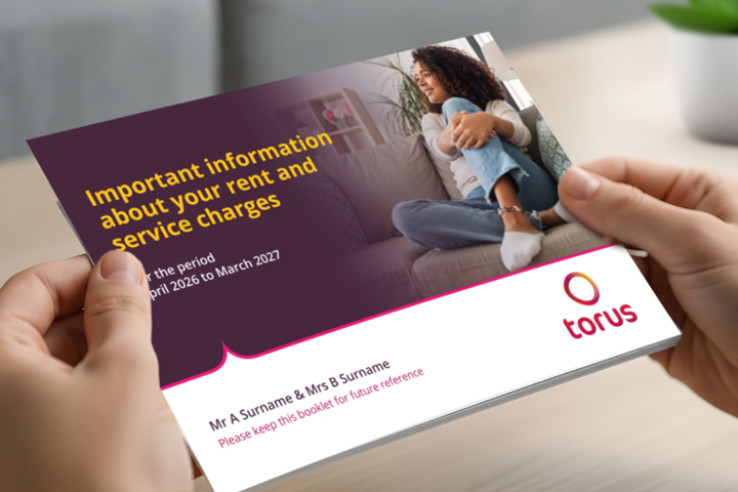
29 June 2023
James has been Safer Estates Compliance Officer at Torus (formerly GGHT) for seven years, working as part of a team of 18 across our three heartlands.
James covers an area in North Liverpool, which includes around 1,500-2,000 Torus homes and is passionate about helping people and communities.
What does being a Safer Estates Compliance Officer involve?
No two days are the same, it is a very varied job. We deal with both lower level ASB, such as noise complaints, and tenancy/neighbour disputes, to more serious ASB involving criminality such as drug use. We also deal with incident of domestic abuse.
It involves looking at issues holistically and not just taking complaints at face value. It’s important to identify if the complaint is ASB, for example the perception of a noisy neighbour may just be people going about their life, children playing, DIY etc.
Also, we must consider that noise from arguing neighbours may be domestic abuse. In a recent case, complaints about arguing neighbours, turned out to be domestic abuse against the tenant from a partner. The abuse was happening in front of her children, instead of progressing as ASB and treating the customer as a perpetrator, support was offered, a Children’s Safeguarding referral was made, and she was given help and support via Social Services and is being supported to be rehoused by our Torus Tenancy Sustainment Team.
A key part of our role is getting out in the community and being visible, post pandemic we have been taking part in Community Impact days, with our colleagues, ensuring that our customers know how to report ASB and supporting communities suffering from ASB.
We build good relationships with the Police to target ASB in challenging areas. As well as attending Multi Agency Partnership Meetings with other Housing Associations, local authorities, Police and Fire & Rescue to work collaboratively to ensure we put the right resources in the right areas, to tackle poor behaviour.
What happens when someone makes a complaint about ASB?
When we received a report of ASB, the details of the complaint are logged onto our system.
Once confirmed as ASB, the complainant is contacted to reassure and to make sure they are aware of the process, and their role in it, stressing the importance of recording relevant information in the diaries we supply. The complainant is also advised that they can remain anonymous.
Once the perpetrator is identified, we also contact them to make them aware of the allegations, no details of the complainant is ever shared with the perpetrator.
What can Torus do to tackle ASB?
Tackling ASB can be a complicated and sometimes a lengthy legal process.
We have several tools in our box to tackle ASB and help individuals or groups (Neighbourhoods), these include mediation services, Good Neighbour Agreements to address specific issues and putting in Acceptable Behaviour Contractors, before action escalates to eviction.
We find that complainants believe that it is easy to act on their reports and just evict people. Evictions are always the last resort once every other option has been investigated, we want to support people to remain in their home, helping them to live in and be part of the community. Evictions are a legal process and are done by the courts, not Torus and require lots of evidence, hence the importance of complainants recording all incidents, that can be used in court.
It is also a common misconception that if someone reports ASB they can automatically move, but again we need evidence to show that they have been affected over a period of time.
In the cases of serious ASB, where the perpetrator has breached their tenancy, including using their property for illegal activity such as drug use/dealing or violence or threats of violence, are escalated to our Enforcement Team who will work with legal services. In a recent case, we worked with the Police, so once they had a closure order on a property that was being using for prostitution and drug use, we can during the closure, look to seek to possession of the property, so the perpetrator won’t be able to return.
Evidence is key to successfully tackling ASB and in addition to the diaries completed by complainants, we use other ways to gather evidence, such as noise monitoring equipment.
We also work closely with partners, including Police, Fire & Rescue, Adult & Children Safeguarding Teams, Mediation Services, Social Services, NHS to gather evidence and to find a solution. In some cases, this involves sourcing finding support for the perpetrator, who may just need help to change their behaviour and change their life around. Sometimes, people don’t realise that their actions impact others.
The action we take must always be reasonable and proportionate, ensuring that any equality challenges are mitigated.
Tell us about an average day
There is no such thing as an average day, sometimes I am in the office completing all the relevant paperwork, as, due to being a legal process, it involves lots of records keeping.
I can be out and about visiting complainants and perpetrators in their home to discuss the case, or carry out welfare checks, to see if any further support can be offered.
I am regularly work with key partners, such as the local authority, Police and Fire and Rescue as well as working with other colleagues when cases need to be escalated or to access support.
My role is a very mixed bag, there have been a few hairy moments over the years, as sometimes situations can get tense or escalate, but it is very rewarding when you make a difference in people’s lives, both victims and perpetrators.
What is your best advice for anyone suffering ASB?
My best advice is to report and record everything in the diaries, evidence is key to a successful outcome.
It is also important that people understand the process and what Torus can and cannot do. There is a lack of understanding of the process and the rules and laws we must work to.
Finally tell us what makes you feel like you have done a good job
It’s simple, to me it’s about going home knowing that I have helped someone to feel safe in their home or I have helped someone who may have been identified as a perpetrator to get the support they need to turn their life around and become a good neighbour.
But we could not achieve positive outcomes without the support of complainants, the community and our key partners.
